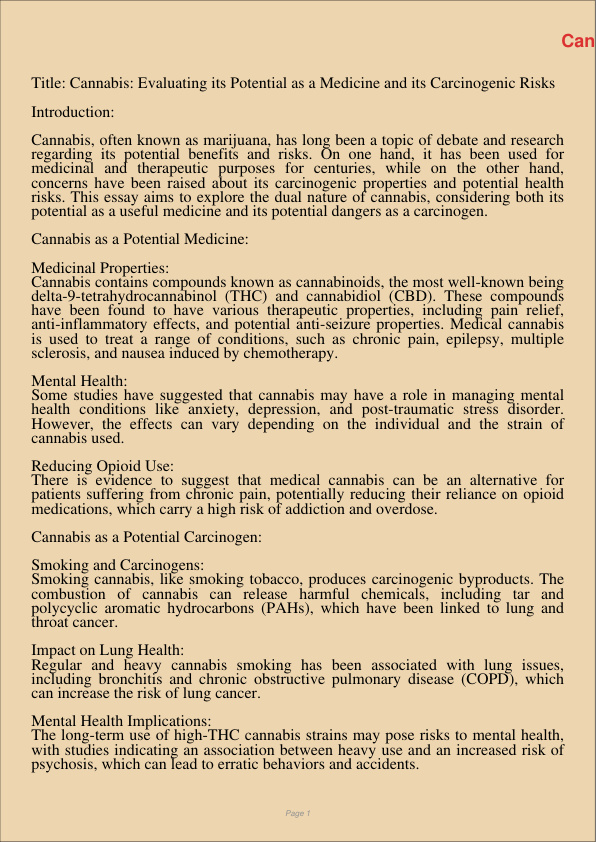Cannabis Is It A Dangerous Carcinogenic Or A Potentially Useful Medicine
Jan 9, 2024
potentially useful medicine
dangerous carcinogenic
Psychology
Philosophy

Title: Cannabis: Evaluating its Potential as a Medicine and its Carcinogenic Risks
Introduction:
Cannabis, often known as marijuana, has long been a topic of debate and research regarding its potential benefits and risks. On one hand, it has been used for medicinal and therapeutic purposes for centuries, while on the other hand, concerns have been raised about its carcinogenic properties and potential health risks. This essay aims to explore the dual nature of cannabis, considering both its potential as a useful medicine and its potential dangers as a carcinogen.
Cannabis as a Potential Medicine:
Medicinal Properties: Cannabis contains compounds known as cannabinoids, the most well-known being delta-9-tetrahydrocannabinol (THC) and cannabidiol (CBD). These compounds have been found to have various therapeutic properties, including pain relief, anti-inflammatory effects, and potential anti-seizure properties. Medical cannabis is used to treat a range of conditions, such as chronic pain, epilepsy, multiple sclerosis, and nausea induced by chemotherapy.
Mental Health: Some studies have suggested that cannabis may have a role in managing mental health conditions like anxiety, depression, and post-traumatic stress disorder. However, the effects can vary depending on the individual and the strain of cannabis used.
Reducing Opioid Use: There is evidence to suggest that medical cannabis can be an alternative for patients suffering from chronic pain, potentially reducing their reliance on opioid medications, which carry a high risk of addiction and overdose.
Cannabis as a Potential Carcinogen:
Smoking and Carcinogens: Smoking cannabis, like smoking tobacco, produces carcinogenic byproducts. The combustion of cannabis can release harmful chemicals, including tar and polycyclic aromatic hydrocarbons (PAHs), which have been linked to lung and throat cancer.
Impact on Lung Health: Regular and heavy cannabis smoking has been associated with lung issues, including bronchitis and chronic obstructive pulmonary disease (COPD), which can increase the risk of lung cancer.
Mental Health Implications: The long-term use of high-THC cannabis strains may pose risks to mental health, with studies indicating an association between heavy use and an increased risk of psychosis, which can lead to erratic behaviors and accidents.
Balancing the Risks and Benefits:
The question of whether cannabis is a dangerous carcinogen or a potentially useful medicine is complex and multifaceted. The key to finding a balance lies in responsible and informed use:
Regulations: Stricter regulations and quality control can help minimize health risks associated with cannabis use. Legalizing and regulating its use can ensure product safety and proper labeling.
Education: Public education on the potential risks of cannabis use, especially for vulnerable populations like adolescents and pregnant women, is essential.
Medical Supervision: Medical cannabis should be prescribed and supervised by healthcare professionals to ensure appropriate use for specific medical conditions.
Conclusion:
Cannabis, with its medicinal potential and potential carcinogenic risks, is a substance that requires careful consideration. While it has demonstrated benefits in managing various health conditions, its potential dangers, especially when smoked, should not be underestimated. Balancing the benefits and risks of cannabis involves responsible use, regulation, education, and informed decision-making to harness its medicinal potential while minimizing health risks. As further research continues, society must adapt its approach to ensure both patient access to medicine and public safety.